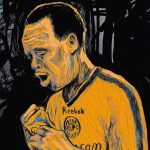James Small’s extraordinary and flawed life
The former Springbok rugby player lived life in the fast lane, resulting in awe-inspiring performances on the field and dramatic collisions off of it.
Author:
18 July 2019

James Small wanted it all. Through his talent for rugby he found fame and the trappings that come with it. He craved adoration from fans and the media, but when it became too much, he was suffocated by it. He became abrasive and resentful at being typecast.
Small wanted victory on the field, too. A fierce competitor, he was prepared to do whatever it took to win and to achieve that, he embraced the “bad boy” image thrust upon him. Reputation and fear were as much a part of Small’s armoury as his speed and tenacity.
He was the perfect father by all accounts. His love for teenage daughter Ruby is displayed in a tattoo of her name on his left forearm, and the soft and gentle way he spoke about her in interviews. She changed his life, for the better.
Was he a perfect husband? Far from it. Not even close. Tales of domestic abuse have dogged him since his acrimonious split from partner Christina Storm. In their heyday, the couple adorned the covers of entertainment magazines and filled the gossip sections of newspapers, which lauded them for being beautifully built human beings with a penchant for the party scene that came with the limelight. For a long time, Small enjoyed that life – the attention, the money and the drugs.
Small wanted to be many things to many people and in the end, as the life ebbed out of his body in a Johannesburg hospital on 9 July, the victim of a heart attack, he had nothing left to give. He was only 50.
Loving life in the fast lane
On the field Small was an accomplished fullback, comfortable being the last line of defence and the one to put his body on that line when the team needed it. But he loved being out on the wing more, and the freedom it gave him to express himself, to take risks and to run like the wind.
The fast lane suited Small a little too well, but it was never an easy ride for the Johannesburg schoolboy. In theory, he wasn’t supposed to excel at rugby. He didn’t fit the mould. He wasn’t particularly well-built. He didn’t have the right pedigree. He wasn’t Afrikaans and, besides, Greenside High School had never produced a Springbok rugby player. But Small was a terrier who fought for his team and his pace on the turf was irresistible to watch. It was this combination of qualities that secured his rise through the ranks from school to provincial and national honours.
Coming from the white, working-class background of Randburg in 1980s South Africa meant many things came easier to Small than his compatriots, but there was personal struggle. His childhood was far from pleasant. It’s understood Small grew up in a troubled home and was exposed to violence. And while those experiences didn’t define who Small was, they certainly added to his mystique. He had a short temper with a violent streak, particularly on the field or after a few drinks at a nightclub. Yet he would often show compassion when an opposition player lay injured on the ground.
Overcome with emotion, Small wept openly when he saw Nelson Mandela’s prison cell on Robben Island for the first time. This is the same James Small who on at least one occasion, that we know of, used the k-word to bully his Springbok teammate Chester Williams.
“It could never occur to them that a black player could be better than a white,” Williams says in Chester, A Biography of Courage by Mark Keohane. “They only tolerated us in the team because it made them look as though they had embraced change. You know, much of it was born of the belief that being white in South Africa somehow made you superior to anyone born black.”
In so many ways Small represented the human condition, filled with contradictions, hypocrisies and raw emotion. He was a man so infuriatingly flawed, but capable of playing an exemplary part in delivering South Africa’s finest sporting moment in June 1995.
A troubled and controversial genius
Former Springbok Os du Randt said of Small, “We always knew James pushed the edge with everything he did. But the one thing we can say with conviction about James Small is that he was always the same. He lived 100%, with no half measures. He was true to himself and didn’t try to be someone he is not. In that regard we take our hats off to him.”
Because of his part in history, his many adoring fans and sport writers may brush over Small’s indiscretions during his peak: the domestic abuse, frequent brawling and verbal tantrums. History will make light of his penchant for beautiful women at the expense of others to which he promised loyalty, and it will look past his apparent links to seedy characters in Cape Town’s club scene. To those who adored him, none of that matters now. He’s gone.
“It’s not easy to be yourself in this world, but James was a prime example of how it should be done. He never allowed people or opinions to change who he was, how he operated and how he saw fit to do things and run his life,” said Du Randt.
Related article:
South Africa post-1994 was a tense country but filled with possibilities as the world opened its doors to the country’s commerce and industry. On Friday 23 June 1995, on the eve of the Rugby World Cup final, Rupert Murdoch signed a $550 million (about R2 billion at the time) deal with New Zealand, Australia and South Africa, heralding the dawn of a professional rugby union and stopping a number of talented players like Jonah Lomu and Joost van der Westhuizen from defecting to rugby league.
The newfound wealth concentrated in the hands of (mostly white) young Springboks meant that along with their star status, they could finally live the life of stars, travelling around the world, buying houses in posh areas and dating models and actresses.
Some in the class of 1995 fell prey to the excesses of the country’s new freedom. For those who were already in positions of power, privilege and influence, a democractic South Africa was a key to further cementing their status, and nowhere was this more prevalent than in white-dominated sport.
More money, more problems
The professional era, coupled with South Africa being the new darling of the sporting fraternity, meant players like Small, the talented and good-looking ones, had the world at their feet. But ultimately, Small became intoxicated by his own fame and fortune. And with his mistakes came the critics, who never really left him alone. They were there to remind him of his flaws – and he hated that.
They hurled words that labelled him a cheat, wife-beater, cokehead and racist. It pushed him over the edge, until he tried to take his own life in 2001. The loneliness had set in, the feeling of being ostracised had seeped into his pores, until he couldn’t stand being in his own skin any longer.
He didn’t succeed at suicide and instead decided to turn his life around, because of Nelson Mandela. A phone call from the struggle icon soon after his suicide attempt changed everything. Small told Mandela how lonely and forgotten he had felt, how depressed he had become. Mandela, who always found the right words to say at the right moment, reminded Small that he was not alone with his problems and that he had so much to live for, like his daughter Ruby. It was a turning point for him.
Small spent two years in therapy and had to delve into his childhood to understand why he behaved the way he did. The perspective that he had lost as a World Cup hero and playboy rugby player was finally beginning to return as he entered his 40s.
“No, I’m not a bad boy any more. That was the image I presented, and I made it work for me financially. But all of a sudden it spun out of control,” he said in a 2009 interview.
Whether they knew the real James Small or not, everyone seemed to have an opinion about him. Many felt compelled to express their views about him, and in truth the public’s only experience of Small was through the eyes of those who loved him for his role in their personal lives and on the rugby field, or those whose lives he impacted with his presence.
“I was hiding away for a long time. I did something wrong and I’ve been man enough to stand and be counted for it. I’ve been through therapy for years and the public shame of it. I’ve lived with my head in the sand for a very long time,” he said in 2009. “But I’m tired of saying sorry. When have you paid enough for your actions? When is enough, enough? I’m not ashamed any more. I’m 40. Now I just feel: to hell with this. You can’t destroy a man’s life of hard work and sacrifice for his country over this.”
At the time of his death, Small professed that he had changed his bad “ways”.
Related article:
He was in the starting line-up when the new South Africa (with the old Springbok) began its international journey against the All Blacks at Ellis Park in 1992. Publicly, he embraced the change that was taking place in the country. He was one of few Springbok players then who took the time to learn the lyrics of the national anthem, Nkosi Sikelel’ iAfrika.
After just a few Tests, the trash talking started. His cup of confidence and self-belief often spilled over into arrogance – and sometimes prejudice.
After scoring against Australia, the third try of his career, he said: “I don’t think we realise how much better we are than them. I think we’re showing them too much respect that they don’t deserve.”
Most rugby players of that generation kept their mouths shut out of respect for the opposition. Not Small. Never Small. He would seize any advantage he could to lord it over them, be it physically or mentally. He never backed down from a fistfight or a swearing match, and for that he earned the dubious honour of being the first Springbok player ever to be sent off, when he swore at referee Ed Morrison.
In his final match in 1997 against Scotland, Small broke Danie Gerber’s record with his 20th try. It was yet another milestone in an exceptional career – and an extraordinary, beautiful and flawed life.


